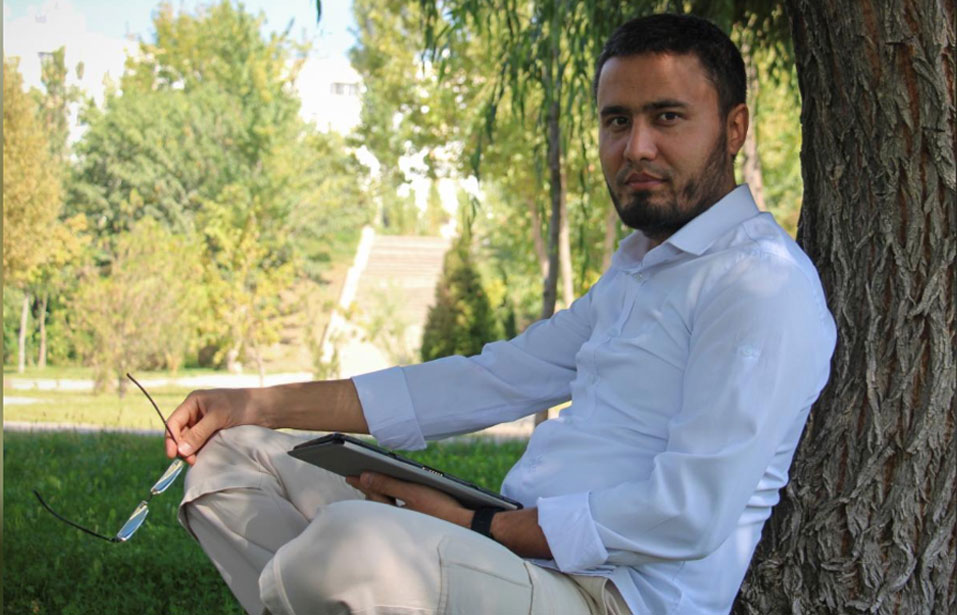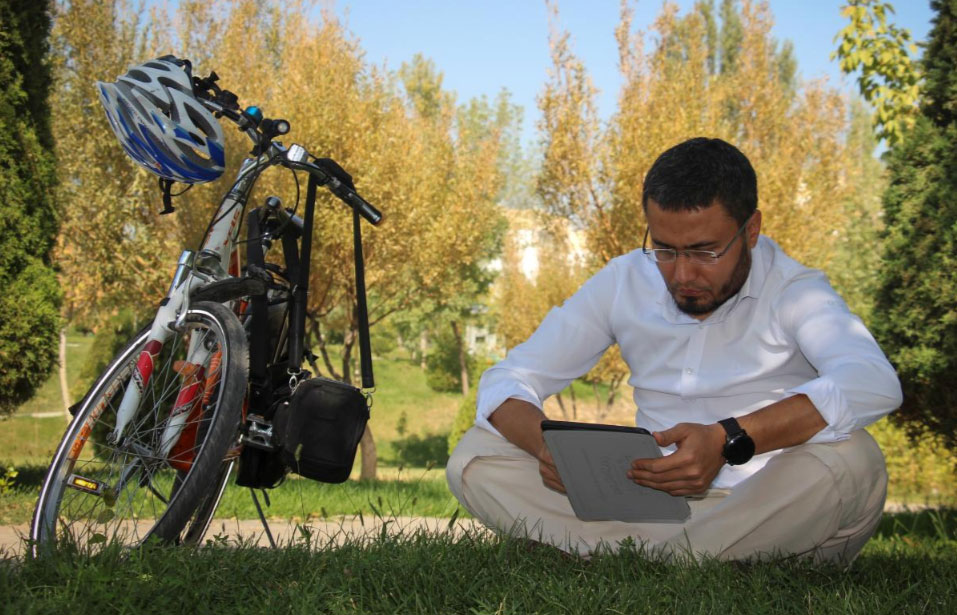Mukhammadsharif Mamatkulov – OCTOBER 31, 2018
TASHKENT (Reuters) – When Uzbek authorities detained several online activists in September, blogger Davronbek Tojialiyev packed some clothes in a bag and waited for the knock on his door.
The police never came, and Tojialiyev, one of a handful of bloggers breaking taboos by criticizing state policies and officials, writes on.
The 34-year-old’s experience suggests the new government in Tashkent is willing to make concessions as it vows to ease restrictions that made Uzbeks wary of speaking freely for the past 25 years.
The detention of the bloggers, however, shows the change has limits, even as Uzbekistan tries to project a more liberal image to foreign investors whose help it needs to revive the economy after years of stagnation.
The government is still sensitive to challenges to its authority, including in the sphere of religion.
The country was rocked by bombings in the late 1990s and early 2000s that were blamed on Islamist extremists, and by an armed uprising in 2005 in which hundreds of people were killed.
Tojialiyev says that mixed messages from the state on freedom of expression are unlikely to stop people like him from pushing the boundaries.
“I was not afraid (of arrest) but I was ready for it,” he said with a smile.
Public criticism of the government was unthinkable under former president Islam Karimov, who ran the majority Muslim former Soviet republic from 1989 until his death in 2016.
Critics such as journalist Yusuf Ruzimuradov spent years in prison on charges related to public security and inciting rebellion. Ruzimuradov was released last March after 19 years behind bars.
“During Karimov’s time bloggers could write only about small issues, mostly social,” said Tojialiyev, whose day job is running Ziyouz.uz, a catalog of Uzbek literature. “It was not possible to talk about serious and political subjects.”
Karimov’s successor, Shavkat Mirziyoyev, has proclaimed a new era of openness and freedom of the press, and moved to curb the powers of the security forces.

FILE PHOTO: Uzbek blogger Davronbek Tojialiyev poses during an interview with Reuters in Tashkent, Uzbekistan October 2, 2018. REUTERS/Mukhammadsharif Mamatkulov
“I regard as real journalists the ones who expose … bureaucracy, indifference, extortion, corruption,” he said in remarks published by his office last year.
“There needs to be plurality of opinions in the national media space,” he said.
The foreign ministry, which answers all queries from the international media including to the police, did not reply to a request for comment on this story.
Mirziyoyev’s approach has improved Uzbekistan’s image abroad and helped it start rebuilding ties with institutions such as the European Bank for Reconstruction and Development (EBRD), which had in effect withdrawn from the country under Karimov.
U.S. Commerce Secretary Wilbur Ross praised “the successful political and democratic reforms that are underway in Uzbekistan” on a visit to Tashkent last week.
“…the types of reforms the President has embraced here are essential to establishing the certitude that companies need to open operations in the local economy,” he told an American-Uzbek Chamber of Commerce Business Forum.
Bordering Kazakhstan, Turkmenistan, Kyrgyzstan, Tajikistan and Afghanistan, the country of 33 million produces gold, natural gas and oil. One of its selling points to foreign investors is as a stepping stone between Russia and China.
Some of the government’s steps have been clumsy, however.
Journalists from Russia who visited Tashkent this month as members of President Vladimir Putin’s media pool, including a Reuters reporter, were instructed not to leave their hotels without official minders “for their own safety”.
YOUNG AND RELIGIOUS
The Uzbek blogosphere has expanded since the election in December 2016 of Mirziyoyev, who was prime minister under Karimov.
Bloggers, writing mostly on Facebook, question policies they see as excessively strict or unnecessary. Mirziyoyev himself has a Facebook page, as do many senior officials, although less than 3 percent of Uzbeks regularly visit Facebook.
One story that went viral was that of a young teacher killed by a truck while cleaning up a highway ahead of a presidential visit last March, part of a mass mobilization of public sector workers by provincial authorities.
Mirziyoyev quickly responded to the outcry, telling reporters he felt responsible for the woman’s death and ordering his subordinates to stop what he called “window-dressing”.
“Bloggers have become the moving force, not only in social networks but in society as well,” Tojialiyev said. “If they raise certain issues the government is forced to address them.”
In several cases, authorities have punished low-level officials after bloggers helped spread news of abuse of power, such as a district mayor filmed beating headmasters for failing to bring enough people to a national holiday event.
On Monday, Mirziyoyev sacked a deputy PM who was criticized on social media after a photo showed his subordinates standing knee-deep in a ditch full of water as a punishment. The announcement did not mention the photo but it follows an online outcry.
BOLDER AFTER SUCCESS
It was successes like these that emboldened about a dozen young male bloggers, mainly focused on religious issues, to criticize a draft of school uniform regulations in June that disallowed hijabs, headscarves prescribed in Islam for girls and women.
After the government enacted the regulations in August, bloggers cried foul and some called for protests. They were joined by Fazliddin Parpiyev, imam of one of Tashkent’s mosques.
The pushback was swift. Police arrested at least eight bloggers and the imam was dismissed. Parpiyev told Reuters he remains out of work after refusing to apologize.
One of the detained bloggers, Adham Olimov, told Reuters a court sentenced him to 15 days of administrative arrest on charges of disobeying police orders. He and others were out of jail by mid-September.
“Things have improved … Under Karimov, we would have been sent to prison for 15-20 years,” said another blogger who asked not to be named so as to avoid further problems.
“(But) I am now avoiding sensitive issues. I have a family … Blogging is not worth going to jail for.”
Tojialiyev said he would continue to write about the school uniform issue, however, and criticized the response as going against the spirit of liberal reforms.
“There was no official explanation or response from the government on what was going on,” he said.
“We live in a democratic society or we claim to have one, but what happened was not in line with our claim – for example, arresting bloggers on trumped-up charges, not informing relatives about the whereabouts of the detainees and so on.”
Tojialiyev said he has not experienced any pressure or intimidation from the authorities, but friends have tried to persuade him to be more careful about sensitive issues.
“We can no longer see the bravery and fury which used to be there (in the blogosphere) months ago,” he says. “Bloggers have once again started writing about minor and old matters.”
While Tojialiyev’s optimism may have wavered, his determination has not.
“I know that what I am doing is not a crime and perhaps that’s why I am not afraid. Also, public and international pressure is a factor now. Maybe this gives me some confidence.”
Additional reporting by Polina Nikolskaya; Writing by Olzhas Auyezov; Editing by Sonya Hepinstall
https://www.reuters.com/article/us-uzbekistan-blogging-insight/uzbek-bloggers-test-and-hit-the-limits-of-new-found-freedom-idUSKCN1N50NW

